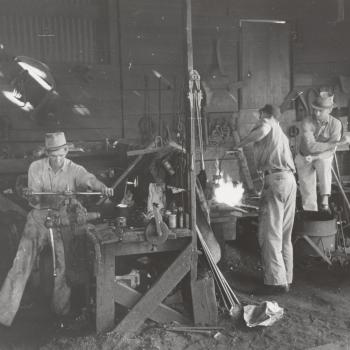In philosophy it is called utilitarianism. In business it is called cost-benefit-analysis. In family life it is thinking about the pluses and minuses. It is the default moral system in the United States and elsewhere. It is functional in limited situations. It has no place, however, in calculating the value of one or another human life.
Many college students have participated in a class exercise where they must choose to throw one person into shark infested sea because their small boat is over-weighted and sinking. This class usually occurs on a day when the professor is unprepared to cover the syllabus. Some professors have elaborate visuals for this off beat class in utilitarianism. Some teachers, like on a Survivor episode, actually have small groups of students pick a classmate to sacrifice.
Our society is at a unique moment. Our medical professionals are overwhelmed. The normal excellence of their care is hampered. Ethics is no longer a classroom theory; it is hard choices in hectic moments. What to do?
It is wrong for TV commentators to talk about life-or-death decisions in utilitarian terms. There is no place for comments like “Grandparents are/should be willing to forego treatment for the sake of a younger generation.” This is not a time for hypothetical comments, for Survivor scenarios. Professionals in hospitals and clinics plus responsible governors and mayors will draw upon their character and in consultation with families make the best of limited choices.
To affirm that each and every human life has its own innate dignity is not to say that any one nurse or doctor will always have all necessary extraordinary equipment and extraordinary stamina to save every single life. In other words, a hospital worker has to do her or his best and has to even go beyond with courage. But then each worker has to shirk off guilt. Rescue operations are a team effort and, unlike in the movies, take place within institutions that have strengths and limitations.
Like everyone in our country, Anthony Fauci’s ethical environment was dominated by utilitarianism: Seek the greatest good for some people; settle for less than ideal for the unfortunate. But Fauci received another ethic based on character or virtue from his Italian-American family, his high school teachers and his study of the classics in college. Many utilitarian influences have surrounded Andrew Cuomo over a long career. But character ethics was taught in his Italian-American family, in his high school and in his college. The same is true for many, many first responders and medical personnel. Their dominant influence growing up and in school was utilitarianism: Add and subtract to make choices. But they too are exposed to virtue in their families, in the behavior and conversation of their schoolmates, in their exposure to the arts and certainly in their workaday experience with families in need.
Trust our dedicated rescue workers. Put faith in society. Turn off the TV commentators and newspaper writers who, removed from the trenches, play like God.
Droel edits a free newsletter on faith and work, INITIATIVES (PO Box 291102, Chicago, IL 60629).











